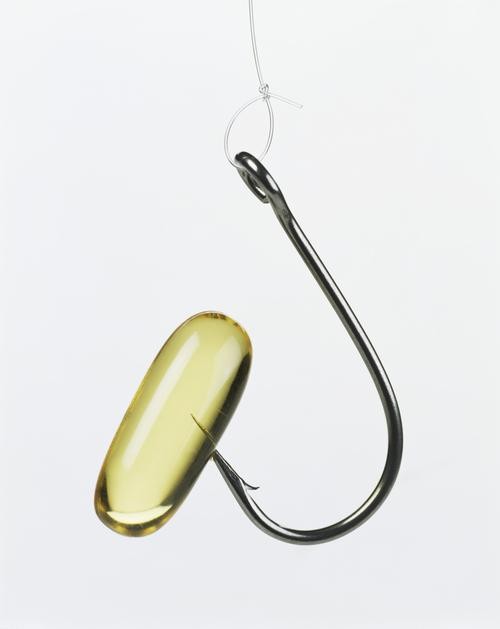
Fish oil
is touted as a magical potion that boosts fertility, heart health, and
weight loss and promotes a clear complexion, while lessening the effects
of depression, ulcers, diabetes and many more conditions. But there’s
another benefit to these glossy little capsules: They may prevent Alzheimer’s disease.
A
new study of 819 people published in the journal Alzheimer’s &
Dementia found that taking fish oil supplements on a daily basis is
associated with a significant decrease in cognitive decline (as measured
by the Alzheimer’s Disease Assessment Scale
and the Mini Mental State Exam) and brain atrophy — important findings
in light of statistics that show that one person per minute is diagnosed
with Alzheimer’s disease.
“We
found that fish oil use was associated with better performance on
standard tests of memory and thinking abilities over time, compared to
those who didn’t take supplements,” lead study author Lori Daiello,
a research scientist at the Alzheimer’s Disease and Memory Disorders
Center at Rhode Island Hospital, tells Yahoo Health. “They also
experienced less brain shrinkage in areas of the brain important for
healthy cognitive aging — the cerebral cortex and hippocampus, the
portion of the brain responsible for forming and retaining memories.”
For
this study, researchers analyzed information from neuropsychological
tests and MRI brain imaging performed at regular intervals for up to
four years during the Alzheimer’s disease Neuroimaging Initiative, a
longitudinal study of brain aging and Alzheimer’s Disease. The
population consisted of a group of older adults with varying degrees of
cognitive capability: normal cognitive function, mild cognitive
impairment, and Alzheimer’s disease. The benefit of fish oil appeared
strongest in the group with normal cognitive functioning. “Retrospective
studies cannot establish cause and effect, so we can’t make a global
recommendation that everyone should start taking fish oil supplements.
But the findings highlight the need for additional research on the
effects of longterm fish oil use on brain health in later life,” says
Daiello.
The main ingredient in fish oil is DHA,
omega-3 fatty acids found in cold-water fatty fish such as salmon,
swordfish, trout, yellowfin tuna, mackerel, and more. (Non fish-lovers
can find it in eggs, milk, and algae-derived supplements). According to
Daiello, there is no definitive evidence that eating fish daily is
better than taking fish-oil supplements. But some people dislike the
fishy breath that lingers after taking the supplements. “In that case,
you could always store the capsules in the freezer, which seems to
diminish the scent,” suggests Daiello. (Though the study did not address
the dosage of daily fish oil to take, the World Health Organization
recommends a daily EPA and DHA intake of 0.3 to 0.5 grams and a daily
ALA intake of 0.8 to 1.1 grams.)
And
while the effects of fish oil have been well-documented, they also
carry a “buyer beware” element. One study, conducted by a testing company called LabDoor,
found that what’s advertised on the label of many supplements may not
live up to their promise of what’s advertised on the labels. When the
company analyzed 30 top-selling brands, they found that six products
exaggerated the amount of omega-3 on their labels by 30 percent. And at
least a dozen products contained DHA levels that were 14 percent less
than advertised. “Mislabeling is a big problem because the FDA considers
fish oil supplements food, not drugs, so they aren’t regulated,” says
Daiello. “So it’s tough to verify the purity of what you buy.”
To select the best supplement, talk to your doctor, who may be able to recommend a pill that’s right for your needs. Or join a subscription-based website such as Consumer Lab, which regularly tests vitamins and supplements.
No comments:
Post a Comment